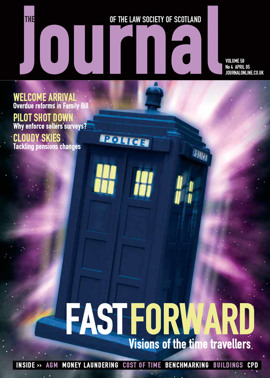Spring in our step

There is nothing better than seeing hard graft give good returns and last month saw several successes, worthwhile changes and solid returns for hard work.
There was a good attendance at this year’s AGM, with worthwhile debate across a range of issues and adoption of the new rules for MNPs, client relations partners and letters of engagement. These rules have now been approved by Council and, subject to approval by the Lord President, should come into force on 1 May, 1 June and 1 July respectively.
The biggest event of the year is yet to come – the Property Matters Conference at the EICC on 22 April is set to be a great success with around 600 solicitors attending. The new annual conference format is proving to be a great success.
With every aspect of property to be discussed, residential property will still be one of the main focuses. The announcement that the Housing (Scotland) Bill includes proposals for a single survey, in spite of the low takeup and before the end of the pilot, has caused surprise and comment. Stewart Brymer outlines in this Journal the Society’s view and the profession’s concerns about the proposals. In particular, he highlights the need for the profession to be aware of the proposals for a purchaser’s information pack.
I am delighted to report two recent successes for the Society. First, the Young Citizens Passport, developed by the Society in conjunction with Hodder Gibson, won the prestigious Saltire Society/Times Educational Supplement Scotland Award for Educational Publications. This is a well-deserved accolade for an excellent publication which aims to inform young people about the law and their rights. A number of firms have purchased a total of over 10,000 copies for distribution to their local schools.
Secondly, the Law Society of Scotland Donald Dewar Memorial Debating Tournament continues to go from strength to strength. There was standing room only for this year’s final and I hope that the suggestion to hold next year’s final in the Scottish Parliament’s debating chamber comes to fruition.
As I write this, there is still no sign of the consultation from the Scottish Executive on complaints handling. Lord Falconer told the recent Legal Services Reform Conference that he wants a complaints system that helps rather than hinders the consumer. Although some of his comments are clearly not applicable to Scotland, other comments he made about confidence in self-regulated complaints handling may find support from some politicians in Scotland, and many in the profession. It remains to be seen whether a cost-benefit analysis of any new arrangements would make them preferable to the current arrangements, or whether the recognised improvements already made by the Society can be developed further to deliver the best model for complaints handling.
In the meantime, the Society continues to modernise and improve its complaints handling systems. Guidance will be available shortly on the application of the new IPS limit of £5,000, which applies to inadequate professional service provided after 1 April 2005, and further improvements are on their way.
We also await the consultation on the strategic review of legal aid. My tenure as President has seen some improvement in the fee rates, but in civil as well as advice and assistance work the fee rates bear no comparison to market rates. That has implications for access to justice and we await an indication from the politicians of what they propose to do. The consultation will be an important document, as access to justice afforded though the provision of legal aid is a key aspect of our democracy. It is also important that there is recognition of the need for proper remuneration for legal aid work and I am keen to develop, along with practitioners, effective negotiation to achieve that objective.
Scotland is lucky to have a vibrant solicitors’ profession whose interest in the law and legal issues at work was clearly shown in the phenomenal response to the Society and the Equal Opportunities Commission research into women in the profession. There were over 2,000 responses from over 9,000 practising solicitors. A report on the survey will be published in the autumn.
I recommend that you also participate in the Cost of Time Survey. The survey will be sent out shortly and I would urge all firms to respond so that the survey gives as accurate a picture as possible of the cost of time in practices across Scotland. Completing a survey for your firm will be even more important this year given that the Society will not publish a unit rate again. Between the time of writing this and publication, meetings are due to take place to discuss the timescales for the withdrawal of the recommended table of fees and I will, of course, keep the profession informed of developments.
Duncan Murray is President of the Law Society of Scotland
In this issue
- Appropriate dispute resolution
- Retailers seek effective court action on crime
- Information and Consultation Regulations
- New identity for criminal justice body
- Spring in our step
- Continuing to develop CPD
- Future present
- Securing the future
- The right support
- A wealth of measures
- Paper-free at last?
- Adding the muscle
- Mark your card
- AGM report
- A seat with a view
- Drawing the line
- Milestones on a long road
- Jobs or birds?
- Safe as houses
- Blueprint for the future
- Scottish Solicitors' Discipline Tribunal
- Bail pilot takes off
- More tales from the Bar
- Book reviews
- Thin end of the wedge?
- Keeper's Corner
- The best laid plans
- PSG's green shoots






